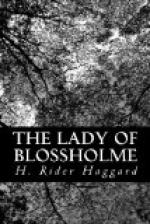“Nay, Emlyn; the Old Bishop has commanded that it shall not be for a week. He would have time to get across England first. Indeed, had it not been for the beating of him in the dark and the twisting of the neck of Brother Ambrose, I believe that he would not have suffered it at all, for fear of trouble afterwards. But now he is full of rage, and swears that he was set upon by evil spirits in the hall, and that those who loosed them shall not live. Emlyn, who killed Father Ambrose? Was it men or——?”
“Men, I think, Mother. The devil does not twist necks except in monkish dreams. Is it wonderful that my lady—the greatest lady of all these parts and the most foully treated—should have friends left to her? Why, if they were not curs, ere now her people would have pulled that Abbey stone from stone and cut the throat of every man within its walls.”
“Emlyn,” said the Prioress again, “in the name of Jesus and on your soul, tell me true, is there witchcraft in all this business? And if not, what is its meaning?”
“As much witchcraft as dwells in your gentle heart; no more. A man did these things; I’ll not give you his name, lest it should be wrung from you. A man wore Foterell’s armour, and came here by a secret hole to take counsel with us in the chapel. A man burnt the Abbey dormers and the stacks, and harried the beasts with a goatskin on his head, and dragged the skull of drunken Andrew from his grave. Doubtless it was his hand also that twisted Ambrose’s neck because he struck me.”
The two women looked each other in the eyes.
“Ah!” said the Prioress. “I think I can guess now; but, Emlyn, you choose rough tools. Well, fear not; your secret is safe with me.” She paused a moment; then went on, “Oh! I am glad, who feared lest the Fiend’s finger was in it all, as, in truth, they believe. Now I see my path clear, and will follow it to the death. Yes, yes; I will save you all or die.”
“What path, Mother?”
“Emlyn, you have heard no tidings for these many months, but I have. Listen; there is much afoot. The King, or the Lord Cromwell, or both, make war upon the lesser Houses, dissolving them, seizing their goods, turning the religious out of them upon the world to starve. His Grace sends Royal Commissioners to visit them, and be judge and jury both. They were coming here, but I have friends and some fortune of my own, who was not born meanly or ill-dowered, and I found a way to buy them off. One of these Commissioners, Thomas Legh, as I heard only to-day, makes inquisition at the monastery of Bayfleet, in Yorkshire, some eighty miles away, of which my cousin, Alfred Stukley, whose letter reached me this morning, is the Prior. Emlyn, I’ll go to this rough man—for rough he is, they say. Old and feeble as I am, I’ll seek him out and offer up the ancient House I rule to save your life and Cicely’s—yes, and Bridget’s also.”
“You will go, Mother! Oh! God’s blessing be on you. But how will you go? They will never suffer it.”




